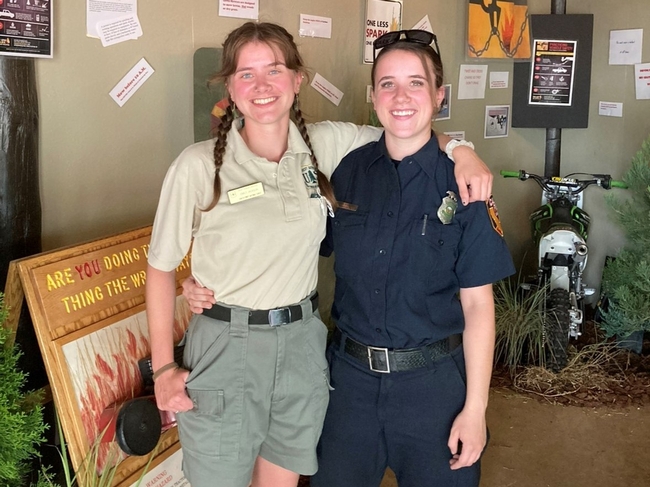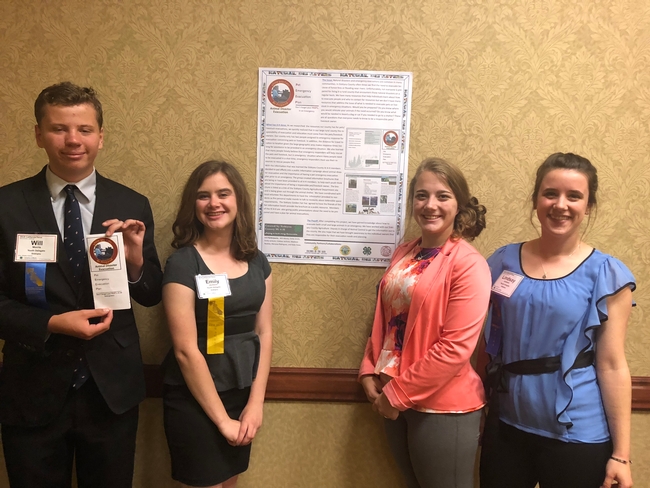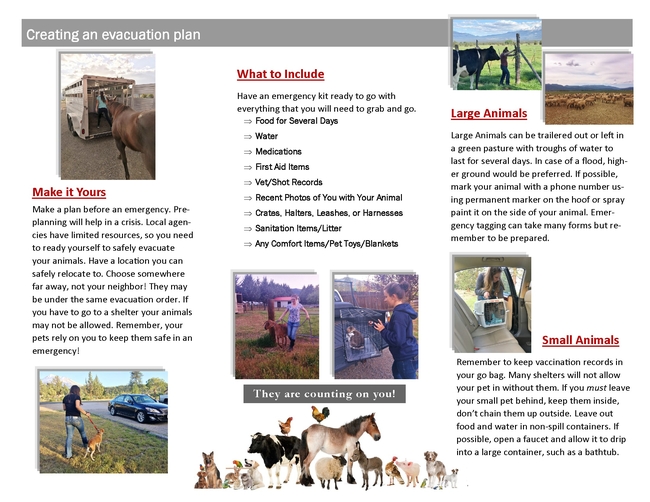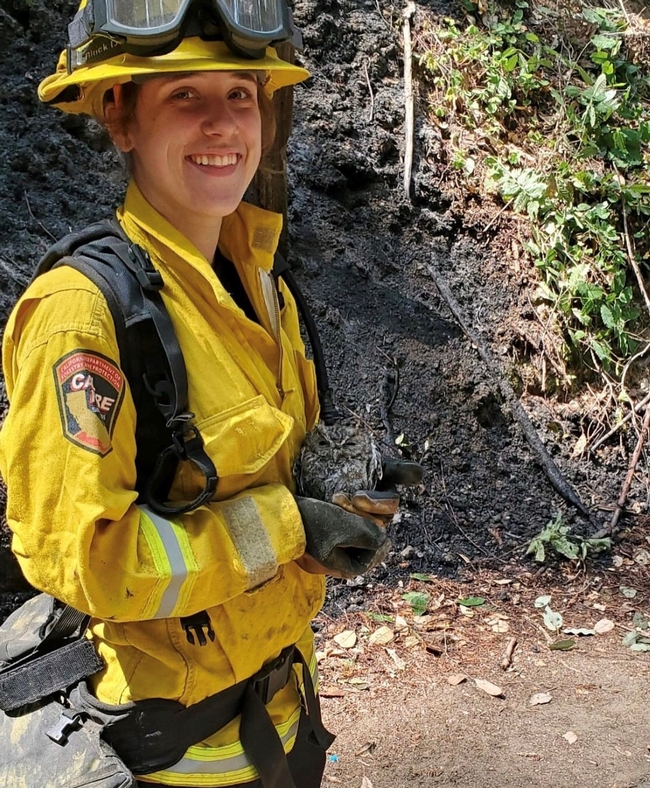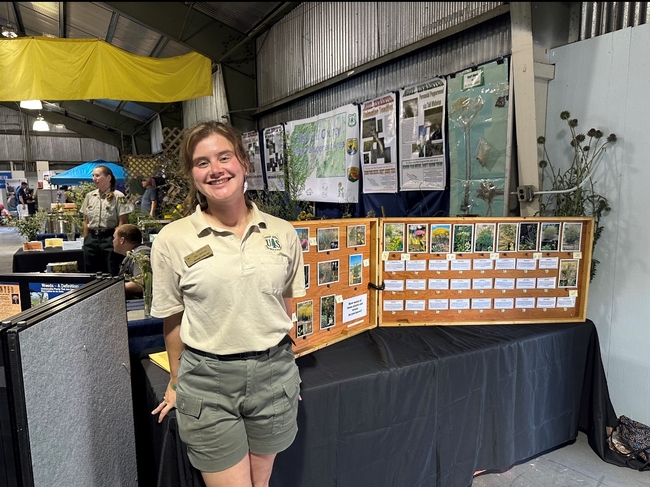Posts Tagged: 4-H
Shearing students, ranchers flock to livestock advisor Harper
UCCE livestock advisor John Harper retires after 32 years
"If you know how to shear, you'll never be poor," Stephany Wilkes remembers John Harper, University of California Cooperative Extension livestock and natural resources advisor for Mendocino and Lake counties, telling her sheep shearing class in 2013.
“He was speaking to everyone, of course, but he really spoke to me: being poor (again) is one of my greatest fears and I've avoided it at all costs,” Wilkes said. Harper's words and a certificate from the course gave her the confidence to leave Silicon Valley for greener pastures.
“Eleven years later, with a successful business and published book about shearing to boot, I can confirm John does not lie to his students,” says the former software developer. “More than that, he is encouraging, calm, respectful, experienced, honest, funny and an excellent storyteller. If not for John, I would not have the life I live today.”
Today, Wilkes is a sheep shearer, knitter and author of “Raw Material: Working Wool In the West.”
Harper officially retired July 1, 2023, after 32 years in his UC Cooperative Extension advisor role, but returned to serve as interim director of UCCE for Mendocino and Lake counties until Matthew Barnes was hired on May 1.
For years, UCCE has offered the only five-day sheep shearing school in California, training 15 to 28 students annually, and Harper has been the force behind it.
“Most of the shearers now in the shearing business in California were trained by me and my fellow instructors,” said Harper, the state's Ed Sheeran of sheep shearing.
He first offered the sheep shearing school in 1993 at the Paul and Kathy Lewis ranch in Upper Lake, with subsequent schools at the Stanley Johnson ranch in Booneville. In the early days, Harper brought in instructors from New Zealand, before he and Mike McWilliams, a former member of the USA Sheep Shearing Team, began teaching. Later Harper moved the school to UC Hopland Research and Extension Center, where he has hosted the school for the past 27 years.
With grant funds from the National Sheep Industry Improvement Association, Harper bought shearing equipment and made seven portable shearing pens to offer shearing school at a private ranch in Clear Lake Oaks this year.
“This program is nationally and internationally known and there is a waiting list of over 1,000 people who want to take it,” Harper said.
Harper's baa-ackground in 4-H
Growing up on his family's farm in Yucaipa, just east of San Bernardino, Harper's electrical engineer father gave him a choice between caring for the horses' hooves and shearing sheep. “I chose shearing since I wasn't very big and didn't like horses leaning on me,” he said.
From age 9 to 19, he was active in the California 4-H Youth Development Program, achieving the Gold Star rank. “I was in 4-H with sheep, horses, veterinary medicine, tractor, electrical, welding and woodworking projects,” said Harper, who won the outstanding junior leader award. “I was a junior leader in sheep and won the state award for my sheep project. I showed registered Hampshire sheep, and my flock grew to 50 ewes before I was done.”
“Shearing sheep helped me pay for college,” said Harper, who earned a master's degree in range management at the University of Arizona and a bachelor's degree in animal science and agricultural economics at UC Davis.
After college, Harper worked as an assistant manager on the PolyPay breed development at Nicolas Sheep Farms in Sonoma before starting a career in Cooperative Extension in Arizona.
When Harper joined UC Agriculture and Natural Resources in 1991, the internet was in its infancy, but he recognized its potential for sharing information. He learned how to write code and created the university's first websites for livestock and natural resources. He also was an early adopter of blogging, Facebook, LinkedIn and Twitter to extend information, which earned him a silver award in 2011 from the Association of Natural Resources Extension Professionals.
Beyond shearing, Harper pioneered cutting-edge research
Although sheep are more photogenic on social media, Harper has been flooded with awards and accolades for his water quality research.
Informed by research from Harper, Lake County rancher Russ Rustici created the first rangeland water-quality ranch plan in the state. Rustici was so pleased that he donated research funding for the entire UC Rangeland Watershed Program team and later established two endowed chairs at UC Davis and one at UC Berkeley. The Rustici Endowment now provides research and education grants for rangeland and cattle efforts.
In 1995, Harper and his UCCE colleagues began teaching the Rangeland Water Quality Planning Short Course to help land managers develop water-quality management plans for their ranches to prevent water pollution. By 2015, they had taught more than 80 of these short courses, reaching more than 1,000 ranchers in 35 counties, representing over 2 million acres statewide. In one follow-up survey, 68% of the participants said they had implemented practices on their ranches to protect or improve water quality.
In 2012, the Western Extension Directors Association presented Harper with its Award of Excellence for the Rangeland Watershed Program.
Eating between the vines
For one livestock research project, he and UCCE colleagues trained sheep to graze the grass in vineyards and not eat the grapevines. “The results went viral internationally and really brought targeted grazing to the forefront,” Harper said. “It also raised sheep number by 2% in our two counties.”
In addition to advising ranchers and teaching sheep shearing, Harper has served in several leadership positions, rotating in every few years as UCCE director in Mendocino and Lake counties. From 2014 to 2017, he led UC ANR's Sustainable Natural Ecosystems Strategic Initiative, advocating for the hiring of experts in climate change, economics, small ruminants, forestry and fire.
“I'm especially proud that we were able to recruit a small ruminant extension veterinary specialist – a position that was unfilled for over seven years, despite California being the second-largest sheep-producing state in the nation,” Harper said.
The certified rangeland manager and rangeland professional has long been a member of the Society for Range Management and the American Society for Animal Science. In 2008, he served as president of the California-Pacific Section of the Society for Range Management. Currently he is the secretary/treasurer for the Mendocino/Lake Wool Growers Association and is ad hoc director of the Mendocino/Lake County Cattlemen's Association.
In 2015, the Society for Range Management gave him the Outstanding Achievement Award-Stewardship. In 2017, the California Wool Growers Association bestowed on him its Golden Fleece Award for Lifetime Achievement. In 2019, Harper was named Range Manager of the Year by the California-Pacific Section of the Society for Range Management for his contributions to the profession. In 2022, the 12th District Agricultural Association Redwood Empire Fair honored him with their Mendocino County Agriculturalist of the Year Award.
Harper also received UC Agriculture and Natural Resources' prestigious emeritus status. In retirement, he plans to play his banjo and continue offering the sheep shearing school with GaryVorderbuggen, who has been teaching with him for 18 years. Randy Helms, a former member of the USA Sheep Shearing Team, and Harper's former students Matt Gilbert, Lora Kinkade and Wilkes are among those who have re-ewe-nited with him as sheep shearing instructors.
“John taught the UCCE sheep shearing schools I attended in 2013-2015, and I was deeply honored to teach beside him in 2023 and 2024. It is one of the highlights of my life,” said Wilkes, now better known for working with wool than developing software.
“Like so many past students, I am forever in his debt,” she added. “We've got to keep this shearing school you started going, John. It is a gift. Thank you.”
‘Super Carbolicious’ 4-H Food Fiesta challenges young chefs
Inside a quiet classroom, Sadie, a 4-H member in Orange County, stands in front of two judges with an insulated cooler bag in hand. From it she pulls out plates, utensils and napkins and sets them down on the table. She unzips the bottom compartment and carefully reaches for a cast iron platter with golden fluffy pancakes piled on top.
“Would you like syrup with your pancakes? I highly recommend it,” said Sadie, an eighth grader who is participating in the annual 4-H Food Fiesta for a second time.
4-H, a youth development program supported by the University of California Agriculture and Natural Resources and administered through local UC Cooperative Extension offices, promotes hands-on experiential learning for all youth.
Rita Jakel, 4-H program coordinator for Orange County, described the Food Fiesta event – intended for ages 5 to 18 – as an opportunity to practice and showcase public speaking skills through a fun, food-related competition.
Youth present their creations before a panel of evaluators, who ask them to describe how they prepared the dish and why, and how they managed challenges throughout the process. The interaction between youth and adult leaders provides a unique opportunity for youth to practice career readiness skills such as job interviews and public speaking.
This year's theme was “Super Carbolicious” and 4-H participants were encouraged to make their favorite dishes using ingredients like pasta, potatoes and bread. Carbohydrates are often perceived as unhealthy, which is not a helpful mindset to have when teaching youth about nutrition. Carbohydrates provide the body with glucose, which is converted into energy that people need to function throughout the day.
Some of the dishes that were presented during the Food Fiesta included chocolate chip banana bread, cheesy baked potatoes, cookies and Nutella-stuffed crepes. 4-H member Kaitlin had only ever attended the Food Fiesta to cheer on a friend. This year, she decided to participate and presented pumpkin macaroni and cheese as her entry.
“Pumpkin mac and cheese is better than the regular one because there's a lot more flavor and you have to use two cheeses: cheddar and parmesan,” explained Kaitlin, a seventh grader. When asked what motivated her to participate instead of a being a bystander this time around, Kaitlin said that she wanted to work on her presentation skills.
“Usually, I'm a bit shy and I don't like to share that much. The Food Fiesta helped me practice speaking up more so that I can accomplish my goals,” Kaitlin said.
Sadie, who loves public speaking, admits that it wasn't always a strength of hers. “There was a time when I hated public speaking. But when I joined 4-H's cake decorating, poultry and food fiesta events, I got more comfortable with public speaking,” she said. “Now, I like going to events and showing off. I get to show off turkeys, my cakes and, today, I presented homemade pancakes.”
Helping to keep the day's festivities running smoothly were two 4-H state ambassadors: Michaela and Laurelyn, two high school seniors. Both have been involved in 4-H for over nine years, with Laurelyn being a third-generation 4-H member. “My grandmother grew up in a 4-H club in Orange County. She still raises breeding lambs for 4-H members to this day,” said Laurelyn, whose mother was a 4-H member in San Joaquin County.
As state ambassadors, they are responsible for creating and presenting workshops during state, national and regional events. “We also engage the public via social media, specifically TikTok and Instagram (@4horangeco),” said Michaela, who is in her second year as an ambassador.
During the Food Fiesta, Michaela and Laurelyn made themselves available to answer questions from participants and their families. Both ambassadors agreed that seeing parents involved in 4-H should not come as a surprise. “Being in 4-H is a family effort. This isn't an extra-curricular where you just drop your kids off and leave,” said Michaela.
Laurelyn shared that the biggest misconception others have about 4-H is that they think it's about introducing youth to agriculture or livestock. There's a civic engagement and leadership component to it, too. “If parents knew about all the ways 4-H can benefit their kids, I think more people would want to join us,” she said. “And they're finding fun ways to help us learn life skills, like this Food Fiesta.”
The homemade dishes weren't the only thing to look forward to, however. In another building, Sandy Jacobs, volunteer event coordinator, and her team set up a kitchen quiz for members. On several tables, there were different cooking tools and participants were challenged to name as many tools as they could.
In another classroom, while some members were presenting food, others presented their themed table setting décor. Participants had to prepare a complete table setting entry including a menu card, centerpiece and table settings for two. Judges considered creativity, use of color, table setting etiquette, knowledge in talking to the judges, and appearance in their evaluation.
Finally, to wrap up the day, members competed in a cupcake decorating competition. Participants were responsible for bringing their own supplies including tools and edible decorations for Cupcake Wars. Depending on their age group, participants had 20 minutes to decorate two to four cupcakes, each of a different theme.
To learn more about 4-H in Orange County, visit https://oc4h.org/.
UCCE Mendocino & Lake Counties Contact Information and Interest Signup Survey
It has been many years since UC Cooperative Extension aka Farm Advisors have done an educational interest survey and updated our client contact database. There have been a lot of changes in our staff and many new farmers and ranchers have come into our counties so the time is right to update old information and let others, that are not familiar with our programs, join our clientele/supporter contact list.
We've also decided to go to a more modern program for informing the public and our supporters about the educational and research programs we offer in Mendocino and Lake Counties. The name of the program we'll be using is called Constant Contact.
We've learned from the Covid restrictions how to offer some of our educational programs through webinars, zoom conferences and social media. We realize not everyone likes some of these formats, or have poor Internet connection speeds. We are offering our traditional public workshops and field days again. We want to make sure you get our information through your preferred delivery methods. For some of you who may not be familiar with our programs, a few questions below will help you to know the specific areas we can provide information and research on and will insure you only get what you're interested in.
Thanks in advance for taking the time to fill out our survey. Personal information provided to us is confidential and will never be shared with anyone. If, after filling out our survey and receiving information from us, you no longer want to be contacted by us you may at any time asked to be removed from our contact database. All participants who submit a survey are eligible to enter a random drawing to win one of three Amazon $100 e-gift cards. We will be drawing for winners from everyone who opted in for the drawing and complete our survey.
The survey is on-line at: https://surveys.ucanr.edu/survey.cfm?surveynumber=7082
Please also share the link with others who would be interested in our programs. Thanks!!!
California 4-H’er selected as runner-up for national 4-H award
National 4-H Council today (Sept. 29, 2023) announced that Michaela Auyeung of Los Gatos, is a runner-up for the 2024 4-H Youth in Action Award. Auyeung is recognized nationally for her commitment to providing STEM access and improving mental and physical well-being for girls in her community.
Auyeung, 17, provides free coding classes and instruction to girls through her program, Girls Who Love to Code. Through partnerships with two school systems, Girls Who Love to Code has engaged more than 250 girls while seeking to close the opportunity and education gap for girls in STEM. Auyeung also provided mental health workshops to aid students in addressing anxiety and created two school pantries to provide hygiene items, school supplies, and snacks to students in need. A senior in high school, Auyeung plans to continue to advocate for gender and socioeconomic equality in education through her outreach and beyond.
The 4-H Youth in Action Awards began in 2010 to recognize 4-H'ers who have overcome challenges and used the knowledge they gained in 4-H to create a lasting impact in their community. To learn more about the 4-H Youth in Action program and the 2024 runners-up, please visit http://4-H.org/YouthInAction.
About 4-H
4-H, the nation's largest youth development organization, grows confident young people who are empowered for life today and prepared for career tomorrow. 4-H programs empower nearly six million young people across the U.S. through experiences that develop critical life skills. 4-H is the youth development program of our nation's Cooperative Extension System and USDA, and serves every county and parish in the U.S. through a network of 110 public universities and more than 3,000 local Extension offices. Globally, 4-H collaborates with independent programs to empower one million youth in 50 countries. The research-backed 4-H experience grows young people who are four times more likely to contribute to their communities; two times more likely to make healthier choices; two times more likely to be civically active; and two times more likely to participate in STEM programs.
Learn more about 4-H at www.4-H.org, find us on Facebook at www.facebook.com/4-H and on Twitter at https://twitter.com/4H. To learn more about the California 4-H Program, visit: https://4h.ucanr.edu/.
4-H youth project helps Siskiyou County prepare animals for emergencies
Planning brochure for pets, livestock fills crucial need as fires an increasing threat
With the McKinney Fire creeping closer to Yreka in the summer of 2022, Emily Jackson and her mother potentially faced the enormous task of getting all their goats, chickens, dogs and cats to safety – while Emily's father and twin sister Lindsay were away fighting the fires.
Fortunately, Emily and Lindsay had gained crucial knowledge about evacuating animals through a 4-H service-learning project they helped lead in 2018. A group of eight 4-H youths, ages 14 to 18, had created a “Pet Emergency Evacuation Plan” (PEEP) brochure, aimed at educating their neighbors in Siskiyou County about the necessary preparations for livestock and pets.
The brochure, available through the Siskiyou County website, remains in use today in this densely forested region that saw another spate of wildfires this summer. The PEEP project team was composed of Kylie Daws, Emily Jackson, Lindsay Jackson, Will Morris, Madison Restine, Maryssa Rodriguez, Emily Smith and Callahan Zediker.
Within those stressful hours in 2022 when the McKinney Fire prompted an evacuation warning during which residents could be required to leave at any moment, Emily Jackson said she and her mother had a game plan in place – thanks to her work on the PEEP project.
“At the time, it wasn't even on my mind,” Jackson said, “but looking back now, I know that having the experience from making that brochure was driving my thought process at the time.”
And while the Jackson family and their neighbors ultimately were not asked to evacuate in 2022, many community members have benefited from the hundreds of copies of the PEEP brochure in circulation, which prompts residents to at least think about what their animals would need in an emergency, Jackson said.
Pet and livestock evacuation tips were needed
Such a resource previously had not been available among the county's emergency preparation materials, according to Jacki Zediker, the 4-H regional program coordinator in Siskiyou County who advised the PEEP project group.
“One piece that was missing was how to help our communities understand that when they evacuate, and they take their pets with them…it's not as simple as just taking their pets with them,” said Zediker, citing the example that some shelters do not take in animals – or do not take animals without proof of vaccination.
Other items to add to the pet's emergency kit include food for several days, water, medications, comfort items or toys, and recent photos of the owner with their animal (proof of ownership).
Zediker had connected the young people with Jodi Aceves, senior deputy agriculture commissioner/sealer for Siskiyou County, who had been overseeing the county's Animal Control programs and emergency response.
“There's a lot of information out there for people evacuating, but not necessarily for livestock and pets,” Aceves said. “Unfortunately, we have had some fires where there were lots of pets and livestock lost.”
She met several times with the 4-H group, discussing the county's evacuation systems and processes and the role of the Office of Emergency Services and law enforcement agencies, and sharing key considerations in preparing for emergencies – such as having a pre-agreement in place with someone who could house an evacuee's animals.
Aceves praised the teens for distilling the vital information into a short and simple brochure that community members could easily read and remember. She also was impressed by the energy and genuine care that the young people put into the project.
“Most of their lives, every summer, they've been in fire,” Aceves said. “It's close to their hearts, and they've seen a lot of their neighbors and other people in the county either affected by fire or evacuated at some point.”
For Lindsay Jackson, in particular, fire and serving the community have been lifelong passions, inspired by her father's work in the area.
“My dad was a volunteer fire chief for the South Yreka Fire Department; he was doing that since I was about two or three, so I grew up watching him go to the trainings, go to a call,” she explained. “When I was 15, I joined the fire department as a cadet to help out with the medical side, but the more I volunteered, I really liked the fire side, too.”
Jackson added that Zediker has a special knack for nurturing and encouraging the interests of the 4-H participants and applying them in a productive way.
“Jacki was really good at figuring out where our passions were and then how we could put our passions into a service-learning project,” she said. “She knew I was really big into fire and helping the community in that way since I was young.”
Zediker also helped the Jackson twins on their senior project, a fire-safety field day at the South Yreka fire station. More than 100 schoolchildren learned fire safety basics, met firefighters and emergency personnel, and heard about 4-H from Lindsay and Emily.
4-H experiences, mentorship inspire career paths
The PEEP project group also was asked by several organizations to share their knowledge about emergency preparations for animals. In addition to presenting a poster about their work at the 4-H California Focus conference in 2018, the group handed out the brochure and shared information at a table during a Juniper Flat Fire Safe Council workshop and resource fair.
Beyond distributing the PEEP brochure at 4-H club meetings, school events and community meetings, the youths have lent their voices to advocating for emergency resources for animals. Zediker noted that they contributed testimonials that helped the county acquire grants for purchasing more portable kennels.
But the most enduring impact of 4-H participation and community service, however, is that those experiences were a springboard for the young adults' careers. Emily Jackson – who participated in 4-H from age 5 to 19 – is now working toward a master's degree in biology at Cal Poly Humboldt, studying how fire suppression and other factors have changed plant communities in the Russian Wilderness.
Whether training colleagues as a U.S. Forest Service crew lead for the past couple of summers, or leading lab sections in general botany as a graduate student, Jackson said she draws on her 4-H experiences – and Zediker's inspirational example – as she pursues a career in teaching.
“In my development as a young adult into an adult now, I cannot overstate how big of a role Jacki played in that,” Jackson said.
Her sister Lindsay, meanwhile, has pursued her passion for fire all the way through the fire academy at College of the Siskiyous, where she also earned her emergency medical technician (EMT) license. Most recently working on fires near Pondosa in Siskiyou County, Jackson has been a seasonal firefighter based at the McCloud CAL FIRE station since 2020.
“It's hard because, in the last three years, I haven't left Siskiyou County, there's just been so many fires here,” she said. “But it's nice being able to help your community and know you're making a difference.”
Lindsay Jackson intends to pursue a bachelor's degree in leadership studies at Cal Poly Humboldt in hopes of getting a full-time position with CAL FIRE.














